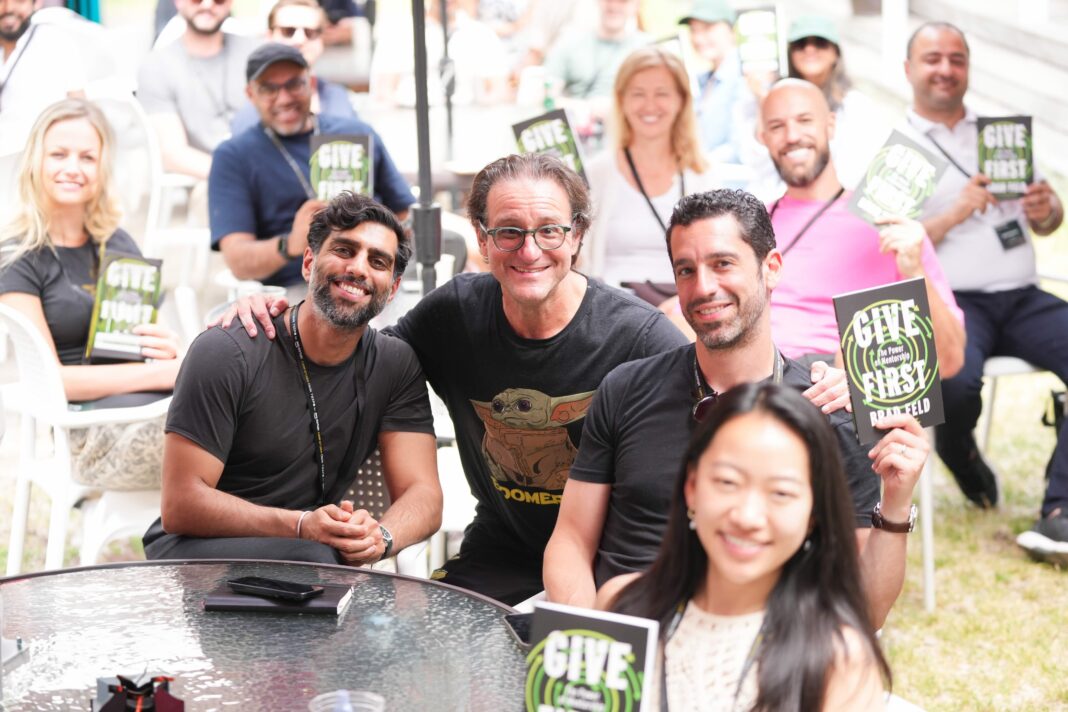I spent two days in Toronto (hosted by Matt Golden at Golden Ventures) and a day in Upstate New York (hosted by Martin Babinec) this week as part of the launch of Give First: The Power of Mentorship. Many others were involved in making this a fantastic trip that touched over a thousand people. Extra special thanks to Julia Baird and Olivia Goldstein for the awesome support.
Last Friday, I did a fun interview with Connie Loizos in TechCrunch titled Brad Feld on “Give First” and the art of mentorship (at any age) that just came out, along with five fireside chats this week.
I kept coming back to three concepts that are the foundation of the Give First philosophy.
Non-Transactional: Today, many aspects of our society are transactional, and, in some cases, excessively so. In Give First, interactions are based on genuine connection, interest, support, and affection, without expecting an immediate or reciprocal return. Now, as I define in Give First, it’s not altruism – you expect to get something back. But you don’t know when, from whom, in what form, or over what time frame. Of course, as a businessperson, I engage in numerous transactional interactions. Still, I try to bring a non-transactional perspective to all of my relationships (business and personal), especially when I’m getting to know a person or engaging with someone with whom I’ve developed a healthy relationship.
Positive-Sum: This is not fluffy “win-win” language, but rather the idea that both parties can gain from an interaction. While the gains don’t have to be equivalent, they aren’t absolute (e.g. one party is +10 and the other party is -10.) When I was young, my parents often referred to this as a compromise. However, in today’s zero-sum transactional world, the compromise is frequently described as the “least terrible or offensive outcome to both parties,” which I call a negative-sum interaction. My goal, even in failure, is to learn something, get better at something, or feel like aspects of the engagement had positive contributions, even though the result wasn’t successful.
Multi-Turn: While some transactions are single-turn (e.g., a one-time negotiation with a counterparty that you will never deal with again), I view my entire life as a multi-turn game. While I’m sure there are situations where I’ve only had one interaction with someone, and there are plenty of times where the other person decided they don’t ever want to deal with me again, I’m open, with limited exceptions, to viewing every interaction as part of a larger, long-term relationship. This is particularly true when things don’t work out, there’s disappointment, or failure. As long as both parties engage thoughtfully and respectfully and try to learn from their mistakes, I will continue to engage. Ultimately, there are some people I have no interest in engaging with; however, almost all of this stems from a fundamental rupture in the relationship or endless ad hominem attacks, rather than a view of experiences as a single turn.
The opposite of my philosophy is a one-time, transactional relationship where there is a winner and a loser. I love it when someone says, “But isn’t that how sports work?” in which I offer up two of the greatest competitors of all time in a sport I love. Consider the relationship between Rafael Nadal and Roger Federer. Is it a one-time transaction interaction where there is a clear winner and loser? If your response is “Yes, each time they played was a single-turn transaction with a winner and loser.” Pause, and say that out loud while considering the 2008 Wimbledon final, or any of these amazing five matches. In each transaction, they challenged each other to play at a higher level. They built on their love and respect for each other as people, players, and champions. And they played many times, each time providing a positive-sum experience for everyone involved, including all the fans. I look back on their long, intertwined careers and see a non-transactional, positive-sum, multi-turn relationship.
Finally, I emphasized many times this week that Give First is a philosophy, not a religion. It’s not a set of rules to follow, commandments from me, or a way to behave that, if you do it rigorously, you will achieve salvation. And, it’s not an obligation. Instead, it’s a set of concepts to consider and incorporate, as you wish, into your approach to life and the way you interact with others.
